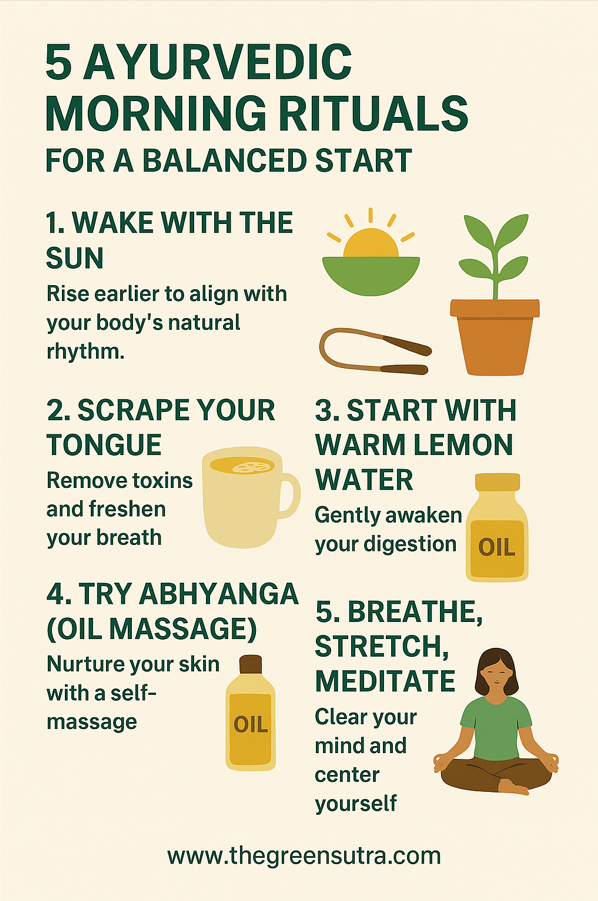According to Ayurveda—the timeless Indian approach to wellness—how you start your morning sets the tone for your entire day. These gentle rituals help balance your body, clear mental fog, and fuel you with steady energy (no coffee crash required). Whether you’re new to Ayurveda or just looking to create a more mindful morning, these simple practices work beautifully solo or together.

🌿 1. Wake with the Sun (or Near It) or Just a Bit Earlier
Ayurveda encourages waking up before sunrise to sync with the natural rhythm of the day. No pressure to leap out of bed at 5 a.m.—even setting your alarm 30 minutes earlier can leave you feeling noticeably lighter, calmer, and more focused.
Try it for a week and see if your mornings feel less rushed and more intentional.

🥄 2. Scrape Your Tongue
It might sound weird at first, but this step makes a big difference. Overnight, your body pushes toxins (called ama) to the tongue’s surface. A quick scrape with a copper or stainless steel tool helps remove this buildup before you sip or eat anything.
Bonus: It freshens breath and supports digestion, all in under 10 seconds.
💧 3. Start With Warm Lemon Water
Swap your morning coffee for a mug of warm water with fresh lemon. It’s simple, but incredibly nourishing—it gently wakes up the digestive system, flushes out toxins, and helps balance your internal energies (doshas).
Feeling adventurous? Add a slice of ginger or a teaspoon of honey for extra digestive love.

🧘 4. Try Abhyanga (Oil Massage)
This daily self-massage isn’t just for relaxation—it’s a way to reconnect with your body. Using warm sesame or coconut oil, gently massage from head to toe before your shower. It nourishes your skin, calms your nervous system, and leaves you feeling grounded (especially if your mind tends to race in the mornings).
You’ll be surprised how quickly this becomes a favourite ritual.

🌬️ 5. Breathe, Stretch, Meditate
You don’t need an hour-long yoga session. Just a few rounds of deep, slow breathing—or a bit of gentle movement—can shift your energy for the day. Pranayama practices like alternate nostril breathing (nadi shodhana) help clear your mental clutter and restore emotional balance.
Even 5 quiet minutes can make your day feel more intentional.

You don’t need to do all five rituals every morning. Choose the ones that feel easy and enjoyable, and let your routine evolve naturally. Ayurveda is about connection, not perfection—and every small step is a powerful act of self-care.





Leave a Comment